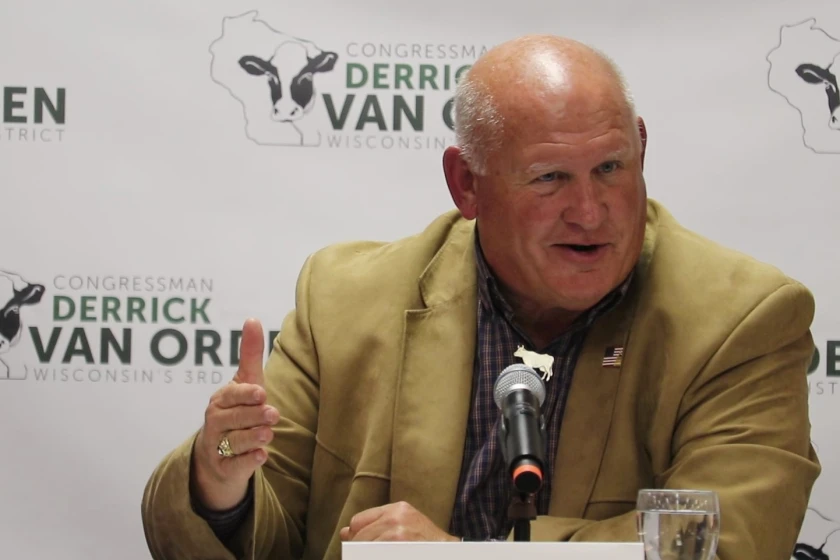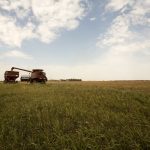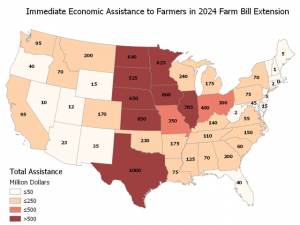
The chair of the House Committee on Agriculture and Wisconsin’s Third District Representative held a farm bill listening session for the region in the state.
Testimony came from America’s dairyland and the world’s largest cranberry growing region as work on the next farm bill reaches its final stages.
A crowd of over 200 people filled the Radisson Center Ballroom in La Crosse on Aug. 16. Hearing from farmers and advocates were U.S. Rep. Derrick Van Orden, who sits on the House Committee on Agriculture, and committee chairman Rep. Glenn Thompson, along with Sen. Ron Johnson.
Van Orden, who represents much of western Wisconsin, is the first Wisconsinite in the House of Representatives to serve on the Ag Committee in almost a decade.
“I’m an all-of-the-above guy when it comes to agriculture,” Van Orden said giving nods to the state’s conventional farmers, cranberry producers as well as the nation’s largest organic cooperative. “There’s a lot of people in Oregon, California and Massachusetts that think they invented Organic Valley, but they didn’t, and it’s right in the heart of our district and we’re so proud of it.”
Thompson said the listening session was one of nearly 70 he’s been to in 32 states over the last two and a half years.
“Reoccurring themes are the importance of protecting crop insurance; that’s very consistent everywhere I go, and our effort is not just to protect you, but trying to strengthen it as well,” Thompson said of the common feedback he gets, along with issues of inflation.
At least once at each listening session, he learns something new and credits the range of producers and advocates wiling to share their story and how it could be impacted through the farm bill.
“Between the listening sessions, the hearings, the portals that we had for the public and for members — we undoubtedly have had more input for this farm bill than any time in the past,” Thompson said.

Getting a new farm bill passed by the end of the year remains a top priority for the current Congress, Thompson said on Aug. 16. He described the process as getting “really close” to the finish line.
“I think we could be in a position before the end of August that we could have language in the House,” Thompson said.
Under that timeline a draft bill should be expected by Labor Day for legislators to work through along with several other bills set to expire at the end of the year.
Dairyland dwindling
Julie Keown-Bomar, executive director of the Wisconsin Farmers Union, said farmers in the Wisconsin are experiencing $14 and under per hundredweight. Many of them are looking for relief through the next farm bill.
“We used to have over 70,000 dairy farms in the state of Wisconsin and we’re at 6,000, and still losing more,” Keown-Bomar said. “Many dairy farmers that we work with are calling for major dairy reform, almost as we had in the last farm bill, and instead of focusing so much on demand to begin to look at mechanisms to control and manage growth.”

Keown-Bomar asked Thompson and Van Orden what plans they had to “tweak the supply of milk” in the next farm bill in order to give dairy farmers a fair price. Thompson said in terms of supply management, there were none.
“We’ve always been very reluctant to get into supply management,” Thompson said. “Dictating what people can grow, and produce and provide — I know there’s some interested in that, but there’s an awful lot of folks that don’t want to be told by government, what they’re allowed to do.”
Milk back in schools
Where Thompson said the dairy industry could expect a win was inside cafeterias of U.S. public schools. He’s the lead sponsor of a bill that revises requirements for milk provided by the National School Lunch Program of the USDA. A bill passed by Congress in 2010 changed nutritional standards for school lunches, and policies implemented by the USDA in 2012 banned whole and 2% white milk, as well as 1% and 2% flavored milk.
The only milk options for students were flavored skim, white skim or white 1% until 2017 when standards began to get rolled back. With the dairy industry facing a long decline in milk sales, Thompson said the concern was that milk types offered in schools drove kids away from drinking it altogether.
“We lost an entire generation of milk drinkers when we started to serve them chalk water,” Thompson said. “Think about the juniors and seniors back in 2010, and they now have kids of their own.”
Whole Milk for Healthy Kids Act of 2023 would override the USDA guidelines and restore the ability of schools in the program to serve whole and 2% milk. Research Thompson cited from the last decade shows the bill — aimed at curbing childhood obesity — did the opposite.
“They looked at the BMI before (the bill), and they looked at the BMI for the 10 years following it, and kids got bigger,” he said, alluding to students choosing “high sugary substitutes” instead of milk.
Cranberry land
Jim Bible comes from a Wisconsin family who’s grown cranberries for Ocean Spray since 1981. His father, Tom Bible, bought an 18-acre marsh without any prior farming experience. Jim joined his dad after college to help run the operation which grew to 32 acres before they sold it to become the State of Wisconsin’s Cranberry Research Station. The family started another cranberry marsh in 1992, Brockway Cranberry Inc., that is still going.

“The cranberry is one of three native fruits to North America, and Wisconsin produces more cranberries than anywhere else in the world,” Bible said.
Bible asked whether the committee intends to pursue continuation of financial support through the USDA for the Cranberry Research Station, which Thompson said was “absolutely” their intention, as well as other research centers that promote the “science, technology and innovation” within U.S. agriculture.
“Wisconsin does such a great job of cranberry research, and looking at all those different bugs, pests and the factors with weather, to make sure that we’ve got a sufficient supply of cranberries that are healthy,” Thompson said. “That is an area for me, that I would like to see a better investment in overall, not just maintaining our research centers, like the one that you have here, but doing a better job of investing in research.”
Van Orden assured Bible that an increase of $500,000 in funding for the Cranberry Research Station was included in the 2024 ag appropriations bill.
“From my experience in the past couple of days, my theme for Wisconsin, is you come for the cheese curds, and you stay for the cranberries,” Thompson said.

























